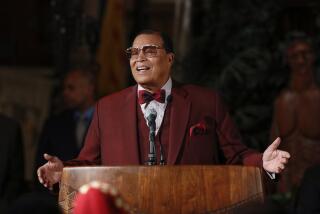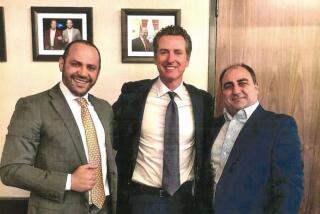The Jew Who Got Louis Farrakhan to Talk
- Share via
BALTIMORE — Hanging up the telephone, stifling an ironic smile, Arthur J. Magida searches for a little patch of calm in his northwest Baltimore home.
“That was NBC calling,” he says.
“About Farrakhan?” he is asked.
“What then?” Magida says. “I said, ‘Listen, Tom Brokaw, I don’t care who you are or how much money you make. . . .’ ”
He laughs at his little joke. Nah, it wasn’t Brokaw on the line--just some network flunky asking for help to make the on-camera folks look like real reporters.
“They wanted to know how they could get an interview with Farrakhan,” Magida says. He would know. His latest book, “Prophet of Rage: A Life of Louis Farrakhan and His Nation” (Basic Books) is in bookstores, helped by three tape-recorded, face-to-face interviews with the Nation of Islam leader, at a time when Farrakhan was presumed off-limits to those with white skin and the compounding felony of being Jewish.
“How did you get to him?” Magida is asked now.
“Oh, my technique was brazen,” he laughs. “I called information in Chicago, and I asked for his phone number. Just like that. Just like any cub reporter.”
The result, three years later, is the first biography of Farrakhan, detailing his life, his words, his Nation of Islam’s history, and how each translates to America’s continuing bilateral anxieties over race.
“When I met him,” says Magida, a former senior editor at the Baltimore Jewish Times, “my first impression was, he’s not the demon I’d been led to think. He’s an extremely charming man, almost totally soft-spoken.”
Except for this: When Magida asked about amends for anti-Jewish statements--the “dirty religion” remark, the Hitler-as-a-”great man” remark, the misleading claims of Jews’ involvement in the slave trade and all the other lines employed as verbal switchblades--Farrakhan exploded:
“Where’s [the Jews’] apology coming from? Jews got a hell of a nerve asking me to apologize. Jews are too arrogant, too proud of their power. They want everybody to bow down to them, and I ain’t bowing down to nothin’ or nobody but God. I’m not getting down on my knees. If I did, you know what Jews would tell me? Too little, too late.”
Well, maybe. But, why scapegoat the Jews in the first place?
“I don’t think Farrakhan chose the Jews,” Magida says. “I think the Jews were thrust upon him, partly by accident. Once it was there, I think he realized this was his ticket.
“It came in ‘84, when Jesse Jackson made the Hymietown remark about New York. The [Jewish Defense League] attacked Jesse. Farrakhan responded by saying, ‘You ever touch him, it’ll be the last brother you ever touch.’ The JDL responded by calling this ‘beer hall demagoguery’ and then Farrakhan made his remarks about Hitler being wicked but great.
“When he blew up at me,” Magida says, “it was spontaneous, yeah, but the duration of the blowup and the theatrical effect after a while became truly calculated. It was his way of showing me that this was something that truly angered him. But he knew how to end it and control it. He has a terrific sense of his control of the drama.”
Magida’s book tries to offer balancing context, juxtaposing the modern history of the black separatist movement with America’s belated, nervous steps toward integration, and the awkward emotional dance of blacks and Jews--once partners in the great civil rights efforts but in more recent years politically uneasy.
In “Prophet of Rage,” Magida looks at each side’s motivations. He writes:
“A peculiar, implicit symbiosis developed between the NOI leader and certain Jewish organizations: A few Jewish ‘self-defense’ groups needed the specter of Farrakhan to help justify their existence (and their budgets). And Farrakhan’s sparring with Jews had become a good part of his draw: He specialized in the outrageous. It proved his mettle. Agree with him or not, he was ‘a man.’ ”
Thus, Magida believes, this is a mutual contentiousness not likely to go away.
“It’s tragic for both sides,” he says. “It’s a war of words and emotions, and protestations of innocence on both sides. [Farrakhan] would love to be further mainstream, but he knows he can’t without putting some of this behind him. Jews would like to be closer to blacks, but find it hard with him there. I found so many black people who would love to have a closer relationship with Jews, but. . . .
“You know,” says Magida, “my first question to Farrakhan was: ‘Why do you want to talk to a Jew?’ He said, ‘I need to talk to Jews. I need to explain myself.’ He was telling me, ‘I’m not a demon, I’ve been caricatured, I don’t want to harm you, but I won’t yield on certain points.’ ”
Magida hasn’t heard from Farrakhan since publication. Though he strove for balance, he expects his subject won’t be thrilled with the portrait.
And, while he found Farrakhan bright and charming, Magida says, “If I were a shrink, I’d say he has semi-Messianic yearnings and inclinations. He sees himself as somebody who can truly deliver his people to the Promised Land, not just physically and economically, but spiritually.
“In fact, he gave a newspaper interview recently and called himself a messiah, and then said, ‘Notice I didn’t say the Messiah, but a messiah.’
“You know,” says Magida, “on a given day, I might feel real good about myself, but I don’t think the word “messiah’s” gonna pass my lips in any form.”
More to Read
Sign up for our Book Club newsletter
Get the latest news, events and more from the Los Angeles Times Book Club, and help us get L.A. reading and talking.
You may occasionally receive promotional content from the Los Angeles Times.










